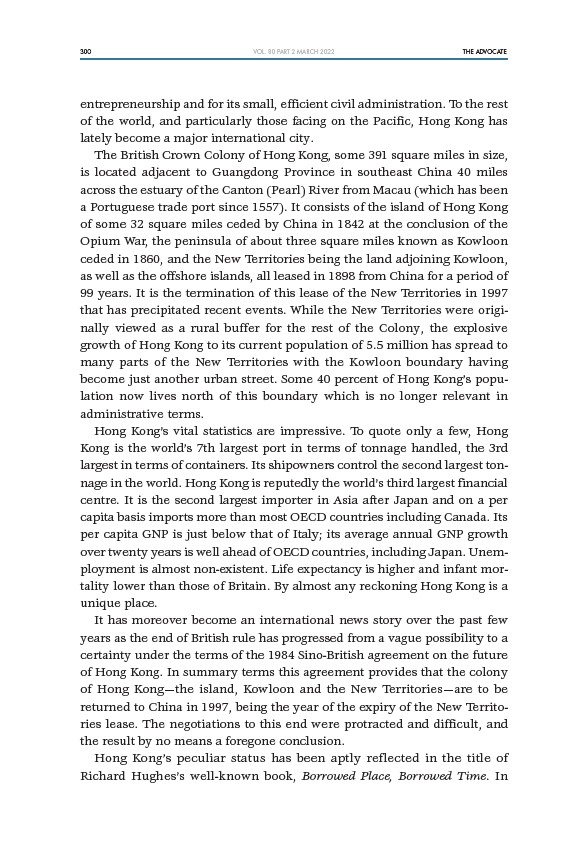
300 THE ADVOCATE
VOL. 80 PART 2 MARCH 2022
entrepreneurship and for its small, efficient civil administration. To the rest
of the world, and particularly those facing on the Pacific, Hong Kong has
lately become a major international city.
The British Crown Colony of Hong Kong, some 391 square miles in size,
is located adjacent to Guangdong Province in southeast China 40 miles
across the estuary of the Canton (Pearl) River from Macau (which has been
a Portuguese trade port since 1557). It consists of the island of Hong Kong
of some 32 square miles ceded by China in 1842 at the conclusion of the
Opium War, the peninsula of about three square miles known as Kowloon
ceded in 1860, and the New Territories being the land adjoining Kowloon,
as well as the offshore islands, all leased in 1898 from China for a period of
99 years. It is the termination of this lease of the New Territories in 1997
that has precipitated recent events. While the New Territories were originally
viewed as a rural buffer for the rest of the Colony, the explosive
growth of Hong Kong to its current population of 5.5 million has spread to
many parts of the New Territories with the Kowloon boundary having
become just another urban street. Some 40 percent of Hong Kong’s population
now lives north of this boundary which is no longer relevant in
administrative terms.
Hong Kong’s vital statistics are impressive. To quote only a few, Hong
Kong is the world’s 7th largest port in terms of tonnage handled, the 3rd
largest in terms of containers. Its shipowners control the second largest tonnage
in the world. Hong Kong is reputedly the world’s third largest financial
centre. It is the second largest importer in Asia after Japan and on a per
capita basis imports more than most OECD countries including Canada. Its
per capita GNP is just below that of Italy; its average annual GNP growth
over twenty years is well ahead of OECD countries, including Japan. Unemployment
is almost non-existent. Life expectancy is higher and infant mortality
lower than those of Britain. By almost any reckoning Hong Kong is a
unique place.
It has moreover become an international news story over the past few
years as the end of British rule has progressed from a vague possibility to a
certainty under the terms of the 1984 Sino-British agreement on the future
of Hong Kong. In summary terms this agreement provides that the colony
of Hong Kong—the island, Kowloon and the New Territories—are to be
returned to China in 1997, being the year of the expiry of the New Territories
lease. The negotiations to this end were protracted and difficult, and
the result by no means a foregone conclusion.
Hong Kong’s peculiar status has been aptly reflected in the title of
Richard Hughes’s well-known book, Borrowed Place, Borrowed Time. In